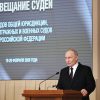The inauguration of the embattled Belarusian autocrat, Alexander Lukashenko, for another term as president has taken place in Minsk in a secretive ceremony that was not announced in advance. Opposition leaders and European politicians immediately denounced the move as illegitimate.
“The day in which the president takes office, the day of the inauguration, is the day of our joint victory – a convincing and momentous victory,” Lukashenko told those gathered on Wednesday, in video footage published by his press service. Army generals, MPs and others were invited to the ceremony.
Lukashenko, whose claim to have won elections on 9 August with 80% of the vote sparked massive and ongoing protests in the country, appears to have held the ceremony without publicity to avoid it becoming a magnet for protesters.
“We haven’t just elected a president, we’ve defended our values, our peaceful life, our sovereignty and our independence, and we have a lot more to do in this regard,” he said, as he swore his oath for a sixth term in office.
A broad coalition has mobilised in opposition to Lukashenko, with daily protests and huge gatherings on Sundays, but he still appears to retain the support of the police and army, as well as backing from the Kremlin.
Profile Who is Alexander Lukashenko?
Show
Hide
Born in August 1954 in Kopys, Belarus, Alexander Lukashenko has served as president of Belarus since the establishment of the office in July 1994. On his initial election, Lukashenko set about establishing an effective dictatorship, sustained by shamelessly rigged elections.
Over the years, Lukashenko has offered his people a sort of Soviet-lite system that prizes tractor production and grain harvests over innovation and political freedoms, and the key part of his political offer has always been political and economic stability.
Lukashenko tried to push this line again into the run-up to 2020’s disputed presidential vote, painting Belarus as an island of stability in a world buffeted by economic crises, political unrest and coronavirus. But the scale of discontent has shown that for many Belarusians, this messaging will no longer work.
The 2020 elections have been described as the deepest crisis he has faced in his career, and in order to secure his supposedly crushing victory, Lukashenko required what appears to be some of the most brazen vote-rigging in recent European history. He appears to have subsequently forced his main opponent, Svetlana Tikhanovskaya, into exile.
After the election, in a congratulatory message, Vladimir Putin urged Lukashenko to consider further economic and legal integration with Russia, which the opposition has warned would undermine Belarus’s sovereignty.
The man sometimes described as “Europe’s last dictator” may have engineered a sixth term in office, but the balance of power has shifted away from him in a way few would have thought possible even a month ago. The EU has said it does not recognise his election, and mass protests against his rule have continued in Belarus.
Photograph: Sergei Grits/AP
Was this helpful?
Thank you for your feedback.
Svetlana Tikhanovskaya, who officially received just 10% of the vote and was forced to flee the country after being threatened, released a video appeal saying the inauguration meant Lukashenko’s term was now officially over.
“This so-called inauguration is a farce, of course. What actually happened today is that Lukashenko is now retired,” she said in a video address. “I, Svetlana Tikhanovskaya, am the only leader who was elected by the Belarusian people and our task now is to build a new Belarus together.”
Tikhanovskaya has promised to be an interim leader while new, free elections are arranged.
Although about 700 people attended the inauguration, news it would happen was kept quiet until the final moment. Earlier on Wednesday morning, rumours were circulating in Minsk that the inauguration could take place over the weekend, and Lukashenko’s press secretary told a Russian news agency that she would give information about when it would take place “closer to the date”. In fact, the ceremony was just a couple of hours away.
Pavel Latushko, a former culture minister who is one of seven leaders of a coordination council meant to oversee a transition of power, said the secrecy of the inauguration proved Lukashenko had no legitimacy.
‘We raised £2m in days’: the donations helping protesters in Belarus
Read more
“Where are the happy citizens? Where are the diplomats? To be honest, it looks more like a mafia gathering to crown a new godfather,” he said. Latushko has also fled Belarus, along with others involved in the council. Many other opposition figures have been arrested and some are facing lengthy prison sentences.
Although Lukashenko has promised constitutional reform, a process backed by Russia, the opposition believes this is mere window dressing, and Lukashenko has made it absolutely clear he does not plan to step down.
The EU has refused to recognise the elections as legitimate, and neighbouring Lithuania said on Wednesday it no longer considered Lukashenko the president.
“Such a farce. Forged elections. Forged inauguration. The former president of Belarus does not become less former. Quite the contrary. His illegitimacy is a fact with all the consequences that this entails,” tweeted Lithuania’s foreign minister, Linas Linkevicius. The Slovak foreign minister, Ivan Korčok, wrote that Lukashenko “has no legitimacy to lead his country”. Other EU foreign ministries released similar statements.
The Russian president, Vladimir Putin, has congratulated Lukashenko on winning the election and received him at his residence in Sochi. Putin is known to dislike the Belarusian leader but appears to have decided to back him for now.























































Свежие комментарии